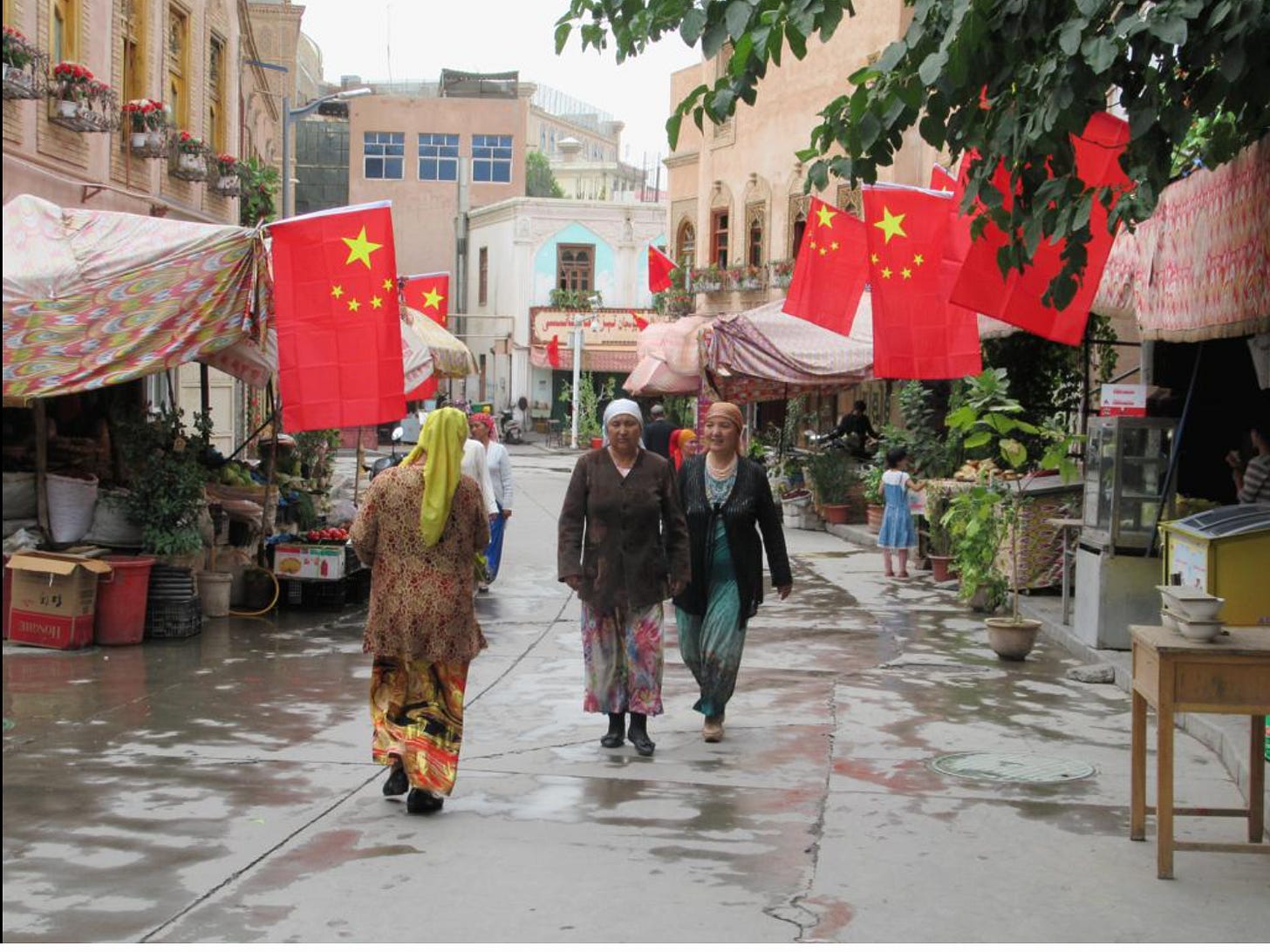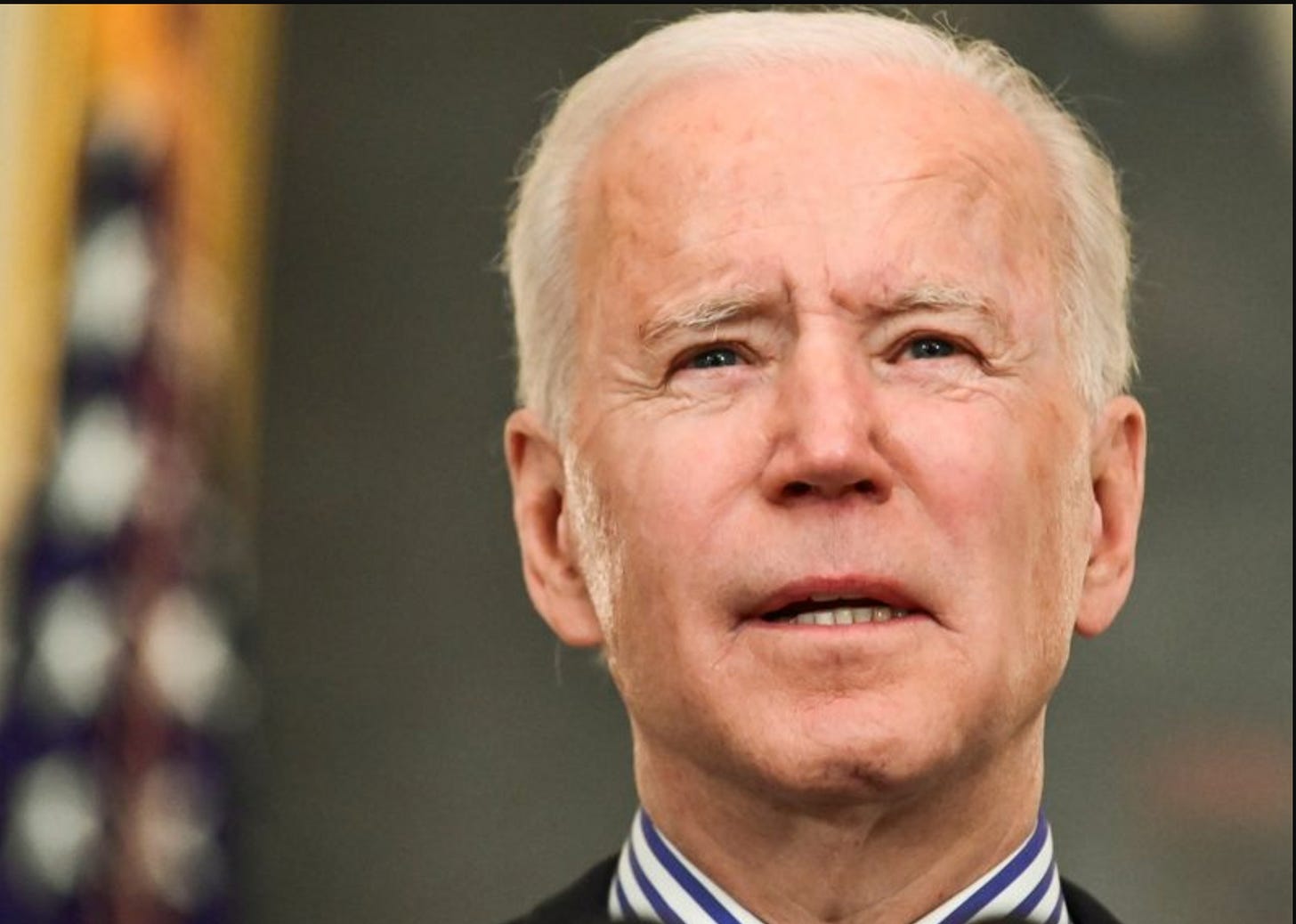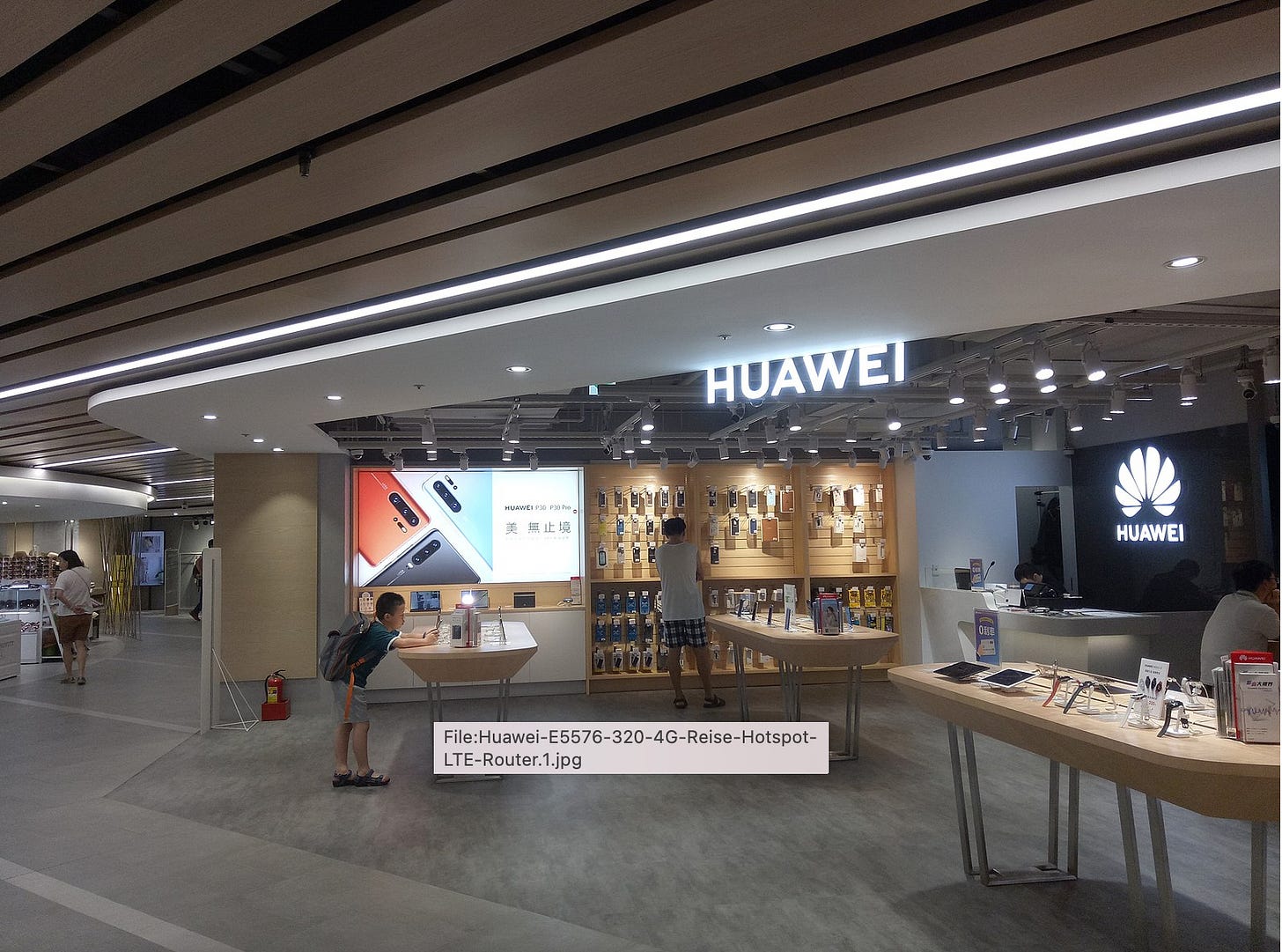On the Governance of Modern Shanghai
Maybe it's harder than Xi Jinping would have us think ... ripples are disturbing the waters of a harmonious, peacefully rising China.
Are zero covid, life and business compatible. Xi Jinping’s gamble of a lifetime. Graphic Design: Mark Corry
Deliveries are turning up in Shanghai again, and some people are even going for walks in their neighborhoods – or at least their compounds. But don’t jump to any conclusions: Shanghai has not officially opened; it just officially doesn’t have any more “community transmission.”
Zero covid essentially means starving covid of human-host cells and it will beat a retreat to whatever bat cave it emanated from. But today, just for example, Shanghai had 858 new cases – 88 of them symptomatic – so we have to assume those cases were all discovered in quarantined conditions.
On-the-edge editorializing, it’s difficult to see how this all doesn’t devolve into manipulated statistics and victory theatrics because experience elsewhere worldwide – look to Taiwan, which held covid at bay valiantly for two years and is now rapidly approaching 100,000 cases a day – would suggest that the latest variants of SARS-COV-2 are not as amenable to lock down measures as earlier variants of the virus. What worked in Wuhan may not work in Shanghai without some sleight of hand.
In the meantime, is Shanghai really poised to go back to “normal”? At least one local resident interviewed by Bloomberg was happy with the latest developments.

Whether the new rules stick and expand to a newly reopened Shanghai will depend on politics and, of course, the prevalence of the virus itself.
ChinaDiction assumes the below is not photoshopped, and that nature really is reasserting its claim on China’s hub of commerce.
Perhaps the weeds should remain in perpetuity as a testimony to the resilience of the Shanghai people and their indomitable socialist (with Chinese characteristics) perseverance in the war over Covid.
Carbon neutral is good, right?
Would you trust this man to fix the economy while you’re busy trying to become president and general secretary for life?
He’s Premier Li Keqiang and whether he’s headed for bigger things (or perhaps a quiet life under house arrest) is the big question circulating from one high-castle China watching garret to another via Tweets and op-ed pieces in all the big-name media sources.
Says Bloomberg ($$):
Premier Li Keqiang’s warning of China’s ‘complicated and grave’ employment situation on Saturday was particularly dire, even for someone who has sounded the alarm for months. But it was also notable another reason: It didn’t mention President Xi Jinping’s Covid Zero strategy.
Just days earlier, the Politburo Standing Committee – on which both Xi and Li sit – warned China’s citizens not to question Covid-control policies that have locked down cities across the country, including Shanghai. That statement, by contrast, contained no mention of the economy.
The Wall Street Journal ($$) opines that Li Keqiang is stepping out of the shadows:
For years, President Xi Jinping has sidelined China’s second most powerful political figure, Premier Li Keqiang. Now, Mr. Li is re-emerging as a force in his own right, a potential counterbalance atop the Chinese government that hasn’t been seen for nearly a decade.
With China mired in its worst economic funk in recent memory, Mr. Li is helping press China’s authoritarian leader to dial back some measures that steered the country away from Western-style capitalism and contributed to China’s economic slowdown, according to government officials and advisers close to decision-making.
The Financial Times ($$) acknowledges splits but is holding back on turning to phrases such as “irreparable fissures,” which is what we at ChinaDiction are inclined to think are emerging:
The fight is between senior party and government officials focused on economic growth and those more concerned with security and party control. Neither group threatens Xi’s primacy but the fallout has echoes of the infighting and policy guesswork that plagued China under Mao Zedong.
‘You’re beginning to see this phenomenon that we saw in the late Mao period,’ said Victor Shih, a professor of Chinese political economy at the University of California, San Diego. ‘Just because they’re all followers of Xi Jinping, doesn’t mean that there isn’t competition and power struggles.’
Bill Bishop, in his May 11 newsletter ($$) lays out the issues but is sensibly cautious on suggesting where it’s all headed;
There are increasing numbers of rumors and overseas stories about pushback against Xi. There is little question many are very unhappy with him, and that his policies are very problematic, but are the people talking to foreign media reflecting a real split that has political potential or are they just grumbling? Does the grumbling matter if the security services and the PLA support Xi?
A prominent overseas Chinese Youtube political talkshow pundit has been saying for over a week that different groups joined together to force Xi to "abdicate 禅让“ peacefully and that it will happen at the 20th, and Li Keqiang will take over as the compromise General Secretary. I remain very skeptical, but this claim and various spinoffs of it have legs.
There is a long history of rumors getting pushed out overseas, recycled back into China, some officials start talking about them, then they get pushed back out overseas as “confirmed”. There is also a long history of the losing side of any political struggle leaking misinformation. At this point all I can say is maybe there is more than just grumbling about Xi along with tactical adjustments by him to deal with the sudden increase in risks, but my base case is that he is still on track for a very successful 20th Party Congress. I would be ecstatic to be wrong.
Nikkei Asia is more assertive on the question of a power crisis:
Premier Li Keqiang's recent sudden comeback to power is the talk of the town in China.
China’s premier is traditionally responsible for macroeconomic policies, as the head of the State Council, China's government. But President Xi Jinping has concentrated power in his hands, and for the past nine years, Li's authority was in name only.
But the dynamics have changed, dramatically, over the past month.
Members of the Chinese Communist Party were astonished on Saturday morning as they turned the pages of the People's Daily, the mouthpiece of the ruling party. On Page 2 was the full text of a speech delivered by Li three weeks prior.
The impact was not so much the content of the premier's words at the April 25 conference on clean politics, but the 10,000-character space the speech was given in the official paper.
Can China – the upper echelons of its politics at least – not have a huge fight about this? It’s not just cabbages in Shanghai, global supply-chain chaos, support for an incredibly unpopular and increasingly unsuccessful war in Europe, inflation and possible impending food shortages everywhere you look, but Xi’s brook-no-arguments, maneuver-to-the-top omnipotence – and more recently his attacks on the private sector, which ironically he’ll need to continue to lockdown cities to serve his zero covid policy.
He may achieve a successful 20th Party Congress, but it won’t be the joyride he possibly expected a year ago, and he’s likely weakened politically in ways that don’t go away overnight. It will, 2022, be the worst year of his life, if it doesn’t kill him – very unlikely. He’s a mistake that is now unassailable as zero covid.
Oh, and, yes, right, btw, The Wall Street Journal ($$) reports that an internal directive will “bar senior officials from owning property abroad or stakes in overseas entities, whether directly or through spouses and children.” It’s a move that’s sure to win over his 20th Party Congress electorate. It’s difficult sometimes not to think that it’s Xi versus the world and given he’s won so far, he’s sure he’ll continue to do so.
All that can be said at this point is that he will (continue to win) until he doesn’t, but in the meantime a lot of people would like to see him on his way.
Come Visit Xinjiang
Kashgar, Xinjiang Autonomous Uyghur Region, formerly Eastern Turkestan.
That’s what the United Nations human rights chief has been planning to do for a very long time – and now it’s finally confirmed, the South China Morning Post reports ($$).
Michelle Bachelet’s trip to China will last six or seven days and will include a visit to Xinjiang, where the Chinese government has been accused of cultural genocide.
While a spokeswoman … said no exact date had been officially confirmed, Bloomberg earlier reported that it will take place next week.
The Post reported that the US high commissioner will meet with senior government officials in Xinjiang.
In other words, it’s highly, highly unlikely she will return with anything but good news.
Biden in Asia to ‘Counter China’
Photo: Wiki Commons
US President Biden has been in Asia this week “as he tries to refocus attention on a top foreign-policy priority of countering China,” The Wall Street Journal reports ($$).
Biden is visiting Japan and South Korea, and, according to the Journal …
… will also shore up a partnership with Australia and India and formally unveil an economic initiative designed to bolster trade and investment with the region, though some allies and partners have given the plan mixed reviews for lacking specifics and not widening access to U.S. markets.
Meanwhile, US national security adviser Jake Sullivan told reporters Wednesday that US intelligence thinks it highly likely that North Korea could conduct a nuclear test, a missile test – or both – during Biden’s trip, due to the usual “rising tensions.”
At the time of press, North Korea had launched no missiles, which could be due to supply-chain bottlenecks, said one Taipei-based tech reporter.
What’s in a word?
Quite a bit when billions of dollars are involved, reports The Economist, which notes that JPMorgan lost its position as the lead underwriter for the Hong Kong listing of Kia Chinese cloud-computing firm when it described China’s ailing tech sector as “uninvestible.”
Actually, according to Bloomberg, editors at the bank had in fact tried to replace the “uninvestible” word with the more neutral word “unattractive,” but – as editors will – they “missed some mentions.”
All is well. Two days after Alex Yao of JPMorgan Chase released his gloomy “uninvestible” reports, he released a new report in which he says, according to the The Economist:
Thanks to some encouraging noises on the [US] delisting dispute, Mr Yao believes that geopolitical risks have receded enough to give his valuation framework some purchase once again. He duly offered new, higher price targets for 18 companies.
Canada snubs Huawei
Canadian? You can use their phones, but your 5G network won’t be provided by a Chinese company with alleged military connections. Photo: Wiki Commons
Canada has become the last of the the Five Eyes intelligence alliance to ban the installation of Huawei equipment. The US and the other members — Britain, Australia and New Zealand — had already banned Huawei.
"We are announcing our intention to prohibit the inclusion of Huawei and ZTE products and services in Canada's telecommunications systems," Industry Minister François-Philippe Champagne said, according to US NPR.
The ban also includes ZTE Corp, one of China’s mega, state-owned tech companies.
Are the Bitcoin Miners Back?
China banned bitcoin mining a year ago, but statistics and reports are leaking out of China that suggest an underground rebound is underway, according to Finance in Bold, a website.
Traffic from China contributed to around 20% of Bitcoin’s overall hash rate from last September last year to January. In July, evidence revealed that activity had dropped to zero as a result of a prohibition on mining enacted in May of last year.
Reports the South China Morning Post:
The data ‘strongly suggests that significant underground mining activity has formed in the country', the CCAF said in a statement. ‘Access to off-grid electricity and geographically scattered small-scale operations are among the major means used by underground miners to hide their operations from authorities and circumvent the ban.’
The Stat
No cars sold in Shanghai in April, according to CNN and other news sources.
Overall, China's car sales slumped 46% in April to 1.2 million vehicles, compared with March. It was the worst April sales in a decade, the China Association of Automobile Manufacturers said last week.
China has imposed strict restrictions as it battles the largest Covid outbreak in more than two years. More than 30 cities in China are under full or partial lockdown, affecting up to 187 million people across the country, according to CNN's calculations.
Noted
Wednesday was the 27th anniversary of the disappearance of the six-year-old Panchen Lama, which is alleged to have been carried out by the CCP as part of ongoing efforts to sinicize Tibetan Buddhism. The Panchen Lama is the supreme authority in seeking out the next Dalai Lama, who has in recent years said repeatedly he will not reincarnate.
Tibetans would like to see the Panchen Lama back in public life, but that is unlikely. Impossible is actually the word, unless some version of him is rolled out after the death of Tibet’s foremost religious leader.


Taiwan
US Church Shooting Rocks Taiwan
As odd as the world gets, US shootings and cross-Strait “tensions” never get play in the same media sentence, but that all changed this week when a gunman attacked Irvine Taiwanese Presbyterian Church in southern California.
One was killed and five injured in a shooting at the Irvine Taiwanese Presbyterian Church by David Wenwei Chou, 68, a Las Vegas resident and a former academic. He was Taiwanese, as were his victims.
New Bloom, a Taiwan web-based magazine, reported on how the shooting fast became politicized in ways that are difficult for even the average China watcher to comprehend. Chou was initially reported to be Chinese.
Initial reports stated that Chou’s actions were motivated due to hatred of Taiwanese and that Chou was a Chinese immigrant to the US. This confusion may have started from the press conference held by law enforcement, in which Chou was referred to as a Chinese immigrant with US citizenship, and as “upset with political tensions between Taiwan and China”.
In actual fact, Chou was born in Taiwan and went to Taichung's most elite high school (Chinese language). Pro-China KMT politician Han Kuo-yu – defeated in the 2020 presidential elections by Tsai Ing-wen – has suggested that Chou was bullied in Taiwan, which of course is possible but doesn’t justify shooting up a church in the US.
But for 10 years his life had been spiraling out of control. He could no longer pay rent and may have been facing homelessness. He recently worked as a security guard., which in Taiwan is the nadir of the employment hierarchy.
This was a man who liked to be called “professor.”
In 2019, he went to the founding meeting of the Las Vegas Chinese for Peaceful Unification (Chinese language), a known United Front group. There he is seen in a photo with a banner that says, in part, “swiftly and violently exterminate [Taiwanese] independence demons.”
But why the Presbyterian Church? Former president Lee Teng-hui – ultimately a godfather of Taiwan democracy and independence, like him or not – was a devout member. Recently deceased Peng Min-ming, a legendary Taiwan activist, is from one of Taiwan's oldest Presbyterian families. His wife from a very wealthy Presbyterian family. Peng was not himelf very religious but just before he died, he sought spiritual guidance from a Presbyterian minister. Taiwan’s de-facto ambassador to the US Hsiao Bi-khim’s father is a prominent Presbyterian pastor. The list goes on …
The word “nuanced” is often used too lightly in Taiwan affairs.
With Michael Fahey in Taipei
Hong Kong
Cardinal Arrest
From a CCP perspective Cardinal Zen has never had his priorities right, and how he’s in custody. Photo: Wiki Commons.
Beijing has long perceived now-90-year-old Cardinal Joseph Zen as troublesome, a democracy firebrand who seemed to put Hong Kong’s sovereignty ahead of Catholicism in China overseen by the Communist Party. This week he was arrested for Hong Kong police for colluding with foreign forces at the risk of China’s national security.
Hong Kong has arguably become somewhat inured to arrests of prominent figures, but a Catholic cardinal? Many are now starting to worry that the latest move heralds yet more draconian clampdowns ahead of the city’s new incoming leader, John Lee, a former cop and security chief and newcomer to “politics.”
Coda
In Australia, a shit-stirrer …?
That’s what a lot of Australians are calling Drew Pavlou, a young Queensland University philosophy major with an axe to grind against the CCP, its treatment of Tibetans, Uyghurs and its infiltration of Australian academia and politics.
But not all Australians. Pavlou is running for Queensland’s Senate on a staunchly anti-CCP platform and a budget of next to zero, but even if he doesn’t win a seat this time around he’s unlikely to disappear from Oz politics as China issues increasingly dominate political debate. Besides, at 22, he’s gone big league, garnering a lot of attention at an age so young he’ll be a veteran of Australia’s scrappy political system by the time he’s 35.
The Daily Mail reports Drew’s mother hopes he’s elected to get him out from under her feet. “I’m fucking sick of him,” the Mail reports her as saying.

\














